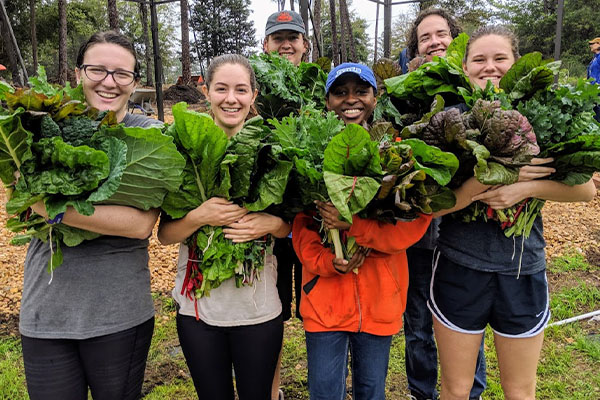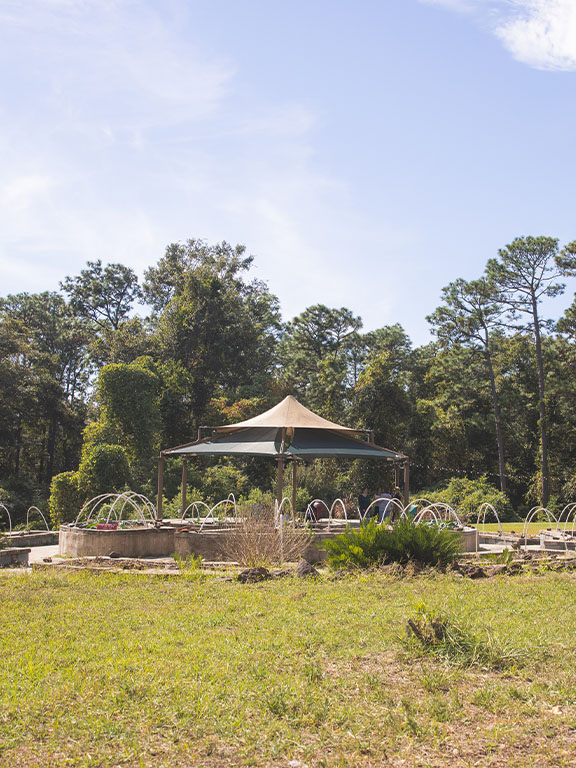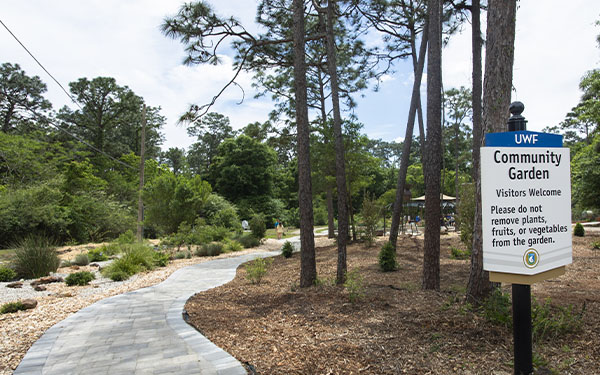The UWF Community Garden is an active service project. It is open to the public and we welcome anyone who shares our passion for digging in the dirt and growing things. The garden helps to develop, cultivate, assess and sustain a network of mutually beneficial community partnerships by cultivating a large and growing network of community partners who are committed to food sustainability, nutrition and student development.
Volunteer for the UWF Community Garden

Please help us continue to keep the garden looking beautiful, or participate in our next workday! All of our upcoming events and workdays can be found on our social media. Don't forget to bring water and wear closed-toed shoes. To volunteer with the Community Garden, please complete our Volunteer Form below.
Volunteer for the Community Garden
About UWF Community Garden
The UWF Community Garden was established in 2009 in collaboration with Manna, a local food pantry. With the help of the UWF Kugelman Honors Program and thousands of volunteers since then, the garden found a permanent site on campus near the water tower and WUWF (Building 88).
UWF Community Garden Mission
- Build community at UWF and in the surrounding region
- Help students develop leadership and community-building skills
- Teach UWF students, faculty, staff and others how to grow food locally and organically
- Encourage healthy eating by increasing access to fruits and vegetables
- Promote food sustainability and security by creating an alternative to the industrial system of food production
- Increase respect and concern for the natural world
About the Argos' Edible Campus
Argos’ Edible Campus grew out of the UWF Community Garden Program and aims to plant 1000 fruit trees and bushes across the UWF main campus.
About Composting at UWF
What is composting?
Composting is the controlled natural process of recycling organic materials, like food scraps and yard waste, into a nutrient-rich soil amendment. By breaking down these materials with the help of microorganisms, composting reduces waste, enriches soil, and supports sustainable gardening practices. It's an eco-friendly way to turn waste into a valuable resource!
What to Compost?
Do: fruit, vegetable, and herb scraps, nut and seed shells, egg shells (not the yolk), coffee grounds, tea bags, unbleached plastic-free coffee filters, and yard waste such as leaves, twigs, and grass clippings.
Don't: Avoid materials that will contaminate the compost and disrupt natural processes, such as meat, dairy, vegetable oils, pet waste, mold, plastic, produce stickers, and packaging unless otherwise labeled as certified compostable.
Where and How to Compost at UWF?
At the UWF community garden, located behind the water tower, there is a wooden structure between the two entrances containing three compost piles. On the right side of the compost piles, there is a metal container containing trash bins. Please place your food waste in the bins and shut the lids, then shut the lid of the container and be sure it latches.
Do not dispose of waste directly into the compost piles. The food waste collected needs to be weighed, and we also want to avoid attracting critters and flying insects.
Why should We Compost?
Composting reduces landfill waste, lowers greenhouse gas emissions, and creates nutrient-rich soil to support plant growth. Composting helps conserve resources, combats climate change, and promotes a healthier environment by recycling organic materials into something beneficial.
Thank You to Our Partner and Sponsors
The UWF Community Garden would not be possible without the support we have received from our community partners over the years. Please join us in thanking and supporting them!
- Bob Ross Tree Service
- Carole Simpson Landscape Design
- Don and Caroline Thompson
- Garden Gate Garden Supply
- IP Foundation
- Jeff Etheridge, UWF Facilities
- Jordan Yee from STOA Architects
- Mary's Heirloom Seeds
- Steve Black, Green Procedures, Inc.







